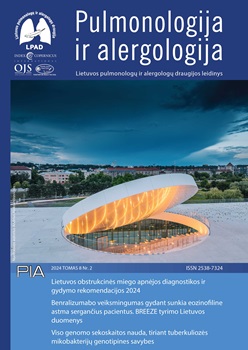BIOLOGICAL PROPERTIES OF EXOSOMES AND ROLE IN EOSINOPHILIC ASTHMA PATHOGENESIS
Abstract
Asthma is a heterogeneous, chronic inflammatory airway disease. Eosinophilic asthma is one of the most commonly found phenotypes in adults. It is associated with increased eosinophil migration into the airways and inflammatory molecules – cytokines, chemokines, and growth factors, production. Exosomes are membranous nanovesicles produced and secreted by most cell types, whose primary function is to transmit intracellular signals by transporting nucleic acids, proteins, and lipids to recipient cells. These nanovesicles uniquely can travel through biological barriers and exhibit low immunogenicity and toxicity, as they do not accumulate in separate organs or tissues. In addition, exosomes can be isolated from all biological fluids and may serve as biomarkers in various disease diagnoses and monitoring. Research on exosomes of inflammatory cells, including eosinophils, is a promising field that may contribute to the comprehension of pathological mechanisms of asthma and novel therapy research. The main task of this scientific review will be to examine exosome biogenesis, composition, functions, isolation, identification, and role in eosinophilic asthma pathogenesis.


